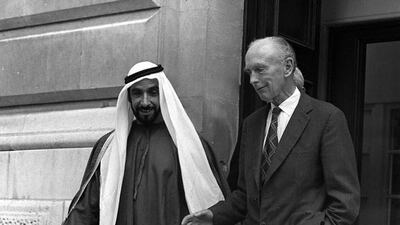Half a century ago, it took only three days to remake the global monetary system.
According to Yale School of Management Dean Emeritus Jeffrey Garten, it was August 1971 and US president Richard Nixon took his top economic advisors to Camp David where they made “the radical and momentous decision to cut the dollar loose from gold”.
So ended the Bretton-Woods system that had been in place since the end of the Second World War.
The move, known as the “Nixon Shock”, was the beginning of the end of America’s total dominance of the world’s economy but it was also a massive show of force.
“Nixon went on television and very clearly articulated ... The dollar would not be backed by gold anymore. There would be a 90-day wage-price freeze in the US to put down inflation. And he imposed a 10 per cent tariff on all imports, which would be removed only after there was a new international monetary agreement. That put a gun to the head of all other countries,” recounted Garten to the Yale School of Management. Garten released a book about the “singular moment” last year.
“The United States could never get away with that again … These policy changes had enormous implications. It’s hard to think of a bigger economic package announced all at one time,” he said.
The decade that followed Nixon’s decision was tumultuous and included oil shocks, high inflation and economic stagnation precipitated by his policies as much as anything else. There were also conflicts such as the wars in Vietnam and in the Middle East.
Unsurprisingly, there have been parallels drawn with that period of history as we experience another energy crisis amid high prices and sanctions on Russia over Ukraine.
The experts can also point to how the 1970s and 2020s are different too.
The US, the world's biggest oil producer, is better able to withstand an oil shock now than in the 1970s, Federal Reserve Chair Jerome Powell said this week, for example.
It is perhaps more interesting to note how a report from Federal Reserve Bank of Dallas on Tuesday has also compared today’s events to another time.
Apart from the now obligatory mention of the 1970s, the Dallas Fed offered up the example of 1991: there was a global recession, triggered by an oil-supply shock following Iraq’s invasion of Kuwait the year before. That downturn lasted less than a year and only once the Gulf War had ended with the liberation of Kuwait.
According to the Pew Research Centre, “the recession from July 1990 to March 1991 was short-lived and relatively mild”.
We are in all likelihood set to experience an economic downturn of some kind as a result of the impact of the Ukraine war.
Highlighting the rising risk, this month, German investor sentiment suffered a record slide not seen since data was first collected by ZEW – which was in 1991, coincidentally.
“A recession is becoming more and more likely. The war in Ukraine and the sanctions against Russia are significantly dampening the economic outlook for Germany," ZEW President Achim Wambach said.
International Monetary Fund managing director Kristalina Georgieva said on Tuesday that the IMF would lower its growth outlook when it releases new forecasts in April.
"What we were striving for was for growth to go up and the inflation that has become a problem to go down," Georgieva said. "Instead, we have the exact opposite. Growth is going down, inflation is going up."
Britain’s annual inflation rate surged to a fresh 30-year high of 6.2 per cent in February. This trend is playing out across countries in Europe, Africa, the Middle East and the Americas.
Global bond markets have also suffered unprecedented losses amid expectations that monetary policymakers will act on inflation by raising interest rates aggressively, Bloomberg reported this week. Bonds have recorded their biggest decline from a peak in data stretching back to 1990, surpassing the financial crisis in 2008. It equates to a drop in the index market value of about $2.6 trillion, worse than about $2tn in 2008.
The current scenario we have is one of heightened fears of a recession amid an energy crisis made worse by a conflict that shows no sign of ending, with added concerns about the use of weapons of mass destruction. That really is a snapshot of the times 31 years ago.
It echoes the mood after Saddam Hussein’s monstrous decision to attack Kuwait. Geopolitically, the invasion turned the world on its axis, much like events in Ukraine have done now.
However, within a year, other pressing matters became more important, such as the break-up of the Soviet Union and the independence of states such as Ukraine. A generation would also embark one of the most sustained periods of wealth creation and economic growth, spurring a life-changing era for millions across the developing world as inflation abated and standards of living improved.
The 1970s are frankly unrepeatable, something we should be grateful for, given that it means avoiding the impact of another world-shaking move like Nixon’s. The 1990s, however, are overdue a replay.




